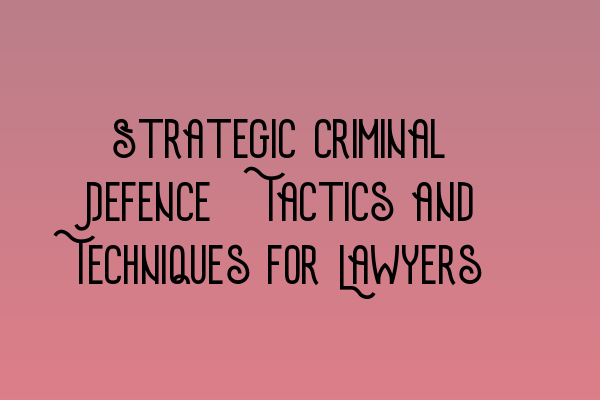Strategic Criminal Defence: Tactics and Techniques for Lawyers
As a criminal defense lawyer, it is essential to develop effective strategies that can help you successfully represent your clients in court. Strategic criminal defense involves understanding the law, analyzing evidence, and crafting a compelling defense to protect the rights and interests of your clients. In this article, we will discuss some key tactics and techniques that can enhance your ability to provide a strong defense.
1. Thorough Case Analysis
One of the fundamental aspects of strategic criminal defense is conducting a comprehensive analysis of the case. This includes understanding the charges, reviewing the evidence, and identifying any weaknesses or inconsistencies that can be exploited to your client’s advantage. By conducting a thorough case analysis, you can develop a targeted defense strategy.
2. Knowledge of Criminal Law
To effectively defend your client, it is crucial to have in-depth knowledge of criminal law. Staying updated with the latest changes in legislation and understanding the precedents set by relevant court rulings can give you an edge in building your defense. Continuous learning and professional development are essential in ensuring that you are equipped with the necessary legal knowledge.
3. Effective Communication
Communication is a vital skill for any lawyer, but it is particularly important in criminal defense cases. Building a strong rapport with your client is crucial to gaining their trust and understanding their perspective. Additionally, being able to communicate complex legal concepts in simple terms to judges and juries can significantly impact the outcome of a case.
4. Negotiation Skills
While criminal lawyers often proceed to trial, having strong negotiation skills is invaluable. Many cases can be resolved through plea bargains or alternative resolutions that can minimize potential penalties for your client. Negotiation skills can help you secure favorable outcomes and avoid lengthy and costly trials.
5. Expert Witness Testimony
Utilizing expert witnesses can be an effective tactic in criminal defense cases. Experts in various fields, such as forensic science or psychology, can provide objective opinions and interpretations of evidence that can strengthen your defense. Expert witnesses can help you challenge the prosecution’s case and present alternative explanations.
6. Cross-Examination Techniques
Cross-examination is a skill that requires practice and finesse. Mastering effective cross-examination techniques can help you undermine the credibility of witnesses and cast doubt on the prosecution’s evidence. By asking targeted questions and exposing inconsistencies, you can weaken the prosecution’s case and strengthen your defense.
7. Preparing Compelling Arguments
Strategic criminal defense involves preparing persuasive arguments that highlight the weaknesses in the prosecution’s case and present a strong defense for your client. Crafting compelling arguments requires careful analysis of the evidence, understanding the relevant legal principles, and using effective storytelling techniques to engage judges and juries.
8. Continual Legal Research
Keeping up with legal developments is crucial for any lawyer, particularly in criminal law. Conducting regular legal research ensures you are aware of any new legislation, legal principles, or court rulings that may impact your clients’ cases. Staying informed allows you to adapt your defense strategies accordingly.
Conclusion
Strategic criminal defense requires a combination of legal knowledge, analytical skills, and effective communication. By utilizing these tactics and techniques, you can provide robust representation to your clients and increase the chances of a successful outcome. Continuous professional development and staying updated with relevant legal information are essential for any lawyer looking to excel in criminal defense.
For more information about related topics, you can explore the following articles:
